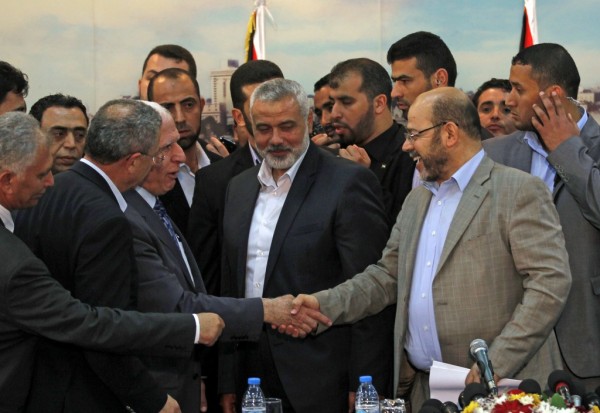
Palestinian Fatah delegation chief Azzam al-Ahmed (center-left) shakes hands with Hamas deputy leader Musa Abu Marzuk (right) in the presence of Hamas Prime Minister in the Gaza Strip Ismail Haniyeh (center), after signing a reconciliation agreement in Gaza on April 23, 2014. Photo by said Khatib/AFP/Getty Images
On Wednesday, April 23, the Palestinians announced that rival political factions Hamas and the Palestinian Liberation Organization reached a reconciliation deal and are discussing plans for a unified government.
The proposed deal would unite Hamas, the Gaza-based radical political group that both the United States and Israel call a terrorist organization, with the moderate leaning PLO seated in the West Bank headed by Palestinian Authority President Mahmoud Abbas.
The deal calls for a unity government to be formed within five weeks and for presidential, parliamentary and provincial elections to be called within six months of the coalition taking form, Hamas Prime Minister Ismail Haniyeh said.
“This has become a national responsibility and a duty,” he said, referring to the reconciliation.
While Israel has been negotiating with Abbas, Hamas refuses to recognize Israel’s legitimacy and has been responsible for multiple rocket attacks on Israeli soil.The surprise unity pact, coming just days before the April 29 deadline for peace talk negotiations lead by U.S. Secretary of State John Kerry, will certainly impact the peace process.
Israel was quick to condemn the unity deal and cancelled a negotiation session scheduled for Wednesday evening.
“This evening, as peace talks were about to take place, Abbas chose Hamas and not peace,” read a statement released by Israeli Prime Minister Benjamin Netanyahu’s office. “Whoever chooses Hamas does not want peace.”
The statement called Hamas “a murderous terror organization that calls for the destruction of Israel.”
U.S. State Department Spokesman Jen Psaki called the development “disappointing” and the timing “troubling,” creating a serious hurdle for the peace process.
“Any Palestinian government must unambiguously and explicitly commit to nonviolence, recognition of the state of Israel, and acceptance of previous agreements and obligations between the parties,” Ms. Psaki said, citing conditions Hamas has repeatedly rejected. “It’s hard to see how Israel can be expected to negotiate with a government that does not believe in its right to exist.”
Some Washington-based Middle East policy experts also believe the unity deal will not bode well for Kerry’s peace process efforts.
Dennis B. Ross, special Middle East envoy, said that the move could make Mr. Abbas “less susceptible to a domestic backlash for continuing the process with the Israelis,” but that “the timing is very problematic — when the process is already faltering, this could be a body blow.”
In her article “Six takes on the Palestinian unity deal,” PBS News Hour author Larisa Epatko shares the reactions of six other Middle East analysts to the unity deal.
On Thursday, a senior U.S. administration official told Reuters that the U.S. would have to reconsider assistance to the Palestinians if Hamas and the PLO go ahead with forming a unity government.
“If a new Palestinian government is formed, we will assess it based on its adherence to the stipulations above, its policies and actions, and will determine any implications for our assistance based on U.S. law,” the official said, speaking to Reuters on condition of anonymity.
It is not the first time that a national unity government has been announced by the rival factions, and on several previous occasions attempts to form an administration have collapsed and some analysts remain skeptical that this deal will come to fruition.
Fatah, the PLO’s main component, and Hamas signed a reconciliation accord in Cairo in 2011 aimed at ending the political divide between Gaza and the Palestinian Authority-ruled West Bank, yet deadlines have come and gone without any progress in implementing provisions of the accord.
“People have heard the same thing over and over again and each time the agreement had been broken by either Fatah or Hamas,” said Samir Awad, politics professor at Birzeit University in the West Bank.
Analyst Hani al-Masri said he believed the reconciliation could collapse at any moment and had “hardly any substance on the ground.”